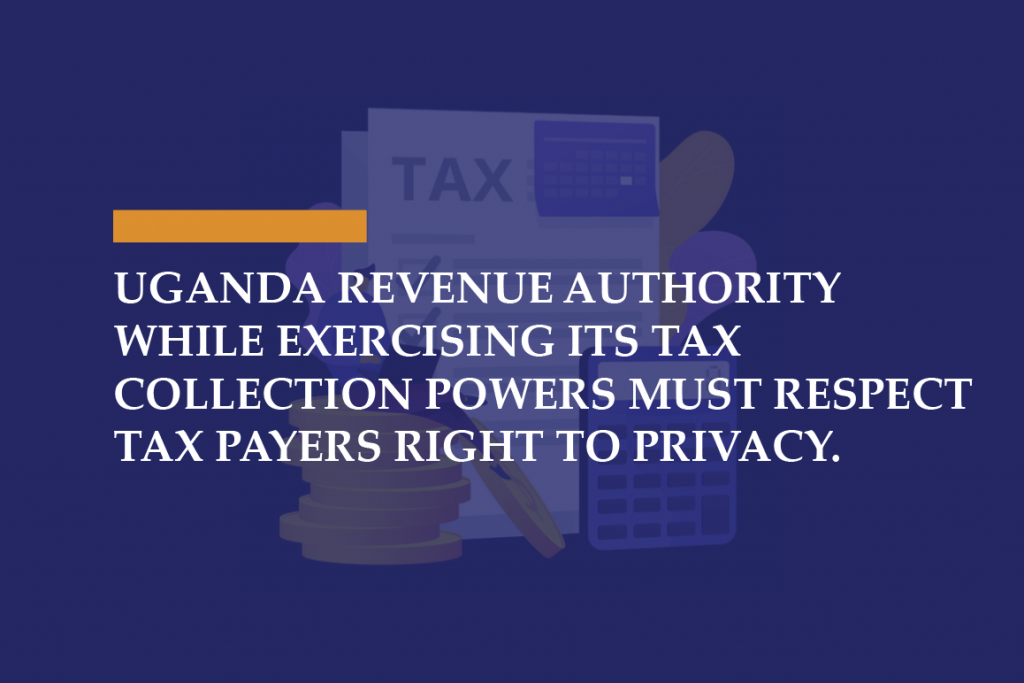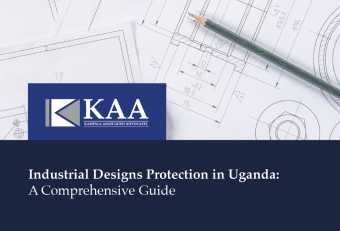The tax law in Uganda bestows on Uganda Revenue Authority with power to collect taxes through various methods which include among others; issuing agency notices, distress and sale of movable property, charging immovable property, seizure of goods and at times closure of business. Ref. Sections 31 to 35 of the Tax Procedure Code Act. Sometimes tax payers have found themselves grappling with the question of URA officials collecting taxes using arbitrary means in violation of tax payers rights.
Recently, the Constitutional Court has had occasioned to reign in on the matter in respect of the right to privacy of tax payers in the case of ABC Capital Bank (Ltd) and 30 ors v the Attorney General and Commissioner Uganda Revenue Authority Constitutional Petition No. 014 of 2018.
Brief facts.
The Petition was filed by 29 Commercial Banks, the Uganda Development Bank and the Uganda Bankers’ Association, an umbrella association of all Licensed financial institutions in Uganda with the mandate to represent the banking sector in industry issues.
On 16th March 2018, in relation to the bank financial institutions and 19th March 2018 in relation to the non-bank financial institutions, the Commissioner General, URA issued to the managing directors of the banks, a notice purportedly issued under section 42 of the TPC Act, requiring each of the petitioners to furnish it with details[s of all bank accounts held by them for the two years period commencing 1st January 2016 to 31st December 2017, which details were to include but were not Limited to the following; the account name, the account number, the name of the signatory, the type of account, a taxpayer identification number (TIN) where available[e, the national identification numbers or business registration numbers where applicable, total credits for each of the two years, total debits for each of the two years, current balance, account holders telephone contact email[. The required information was supposed to be availed by 30th March 2018. The details of the bank accounts sought by URA constitute bank account information of the entire banking sector.
The petitioners were aggrieved by the notices and filed a Constitutional Petition contending that sections 41 and 42 of the Tax Procedures code Act, 2014 also referred to as TPC Act which allows URA access to premises, records and data storage devices are inconsistent with and contravene the right to privacy under article 27 (2) and right to a fair hearing under Article 28 of the Constitution of the Republic of Uganda. They also challenged the blanket notices requiring information on all bank accounts as contravening Article 27(2) of the Constitution.
Petitioner’s arguments.
The petitioners’ submitted that both section 41 (7) (a) and 42(4)(a) of the Tax procedures Code Act, 2014 override any law relating to privilege or public interest thereby overriding legal privilege and the right against self-incrimination contrary to Article 28 of the Constitution. That the right to a fair hearing and by extension the right to legal privilege is non-derogable and the rights cannot be derogated from even in the public interest.
With regard to the right to privacy under article 27, the Petitioners argued that there is no doubt that the activities and information which was sought under sections 41 and 42 of the TPC Act relate to the privacy of individuals. That even though the right to privacy is not absolute, the impugned sections go beyond what is acceptable and demonstrably justifiable in a free and Democratic society. The sections give URA unfettered powers to access premises, records and data storage devices. Further, the powers are not subject to any judicial or quasi-judicial control or even any administrative supervision.
On the issue of the notices issued, the Petitioners argued that financial information of individual is private information which is subject to the duty of confidentiality as between the banker and the customer. That the notice to avail all details of bank accounts contravened article 27 (2) and 43(2) (c) of the constitution because it is beyond what is acceptable and demonstrably justifiable in a free and Democratic society for the reason that; The notice was issued to all bank and non-bank financial institutions in Uganda with a blanket demand in respect of each and every bank account held in Uganda whether or not it belongs to a taxpayer. The overreaching nature targeted both taxpayers and non-taxpayers and takes it outside the realm of the tax statute pursuant to which it was purportedly issued. The request was an indiscriminate fishing exercise with no rational basis and therefore impairs the right to privacy of all bank account holders in Uganda protected by article 27 (2) of the Constitution in a manner that far exceeds what is necessary to accomplish the objective of tax collection.
Respondents’ arguments
The Respondents argued that URA’s actions are legitimate, lawfully exercised within the legal framework and constitutional mandate and does not infringe any provisions of the Constitution as alleged. They submitted that the impugned sections of the TPC Act,2014 do not in any way contravene articles 28 and article 27 of the Constitution and does not nullify the law relating to the privilege against self-incrimination and legal professional privilege but simply fit their application to the confines of the Constitution. That even though the right to a fair hearing is absolute, there are other components of the right which are not absolute such as the right not to incriminate oneself and legal privilege oneself which can be limited in the public interest .
They further added that the legislative objective of providing for the effective tax collection is a sufficiently important to override the fundamental rights of the petitioners against self incrimination in order to deal with challenges like offshore accounts, tax evasion, illicit with commission and money laundering among others. That the Petition was a blanket petition which was exaggerated and misconceived and an attack on the duty of URA to collect tax revenue.
On the right to privacy, the Respondents submitted that article 27 does not confer an absolute right to privacy. That intention of legislature in enacting section 4l of the TPC Act, 2014, was to enable the Uganda Revenue Authority effectively collect taxes and curtail tax evasion and fraud. In the premises, the alleged infringement is acceptable and demonstrably justifiable in a free and Democratic society as the object is necessary for the good governance of the nation.
In relation to the notices, the Respondents argued that the information required by the Commissioner is by mandate of the Law for a legitimate purpose and public interest. That the bubble of secrecy between the bank and the customer can be pierced where there is a duty to the public to disclose. Respondents invited the court to take judicial notice of the fact that the people of Uganda need delivery of services by the government. Accordingly, that public interest requires that information be disclosed to the respondent to facilitate tax collection for the good of the general public.
Constitutional Court Ruling
The Constitutional Court delivered its ruling on 9th March 2023 partially allowing the Petition.
On the issue of whether Sections 41 and 42 of the TPCA contravened Articles 27 and 28 of the Constitution of the Republic of Uganda, the Constitutional Court held and reasoned as follows;
That the information sought by URA under Sections 41 and 42 of the TPCA does not violate the right to a fair hearing under article 28 of the Constitution with regard to the right to self incrimination and legal privilege.
The Court reasoned that Article 28 deals with proceedings before an independent and impartial court or tribunal established by law. The principles of fair hearing under article 28 do not relate to the principles for investigation of the tax matters as the Commissioner is not an independent tribunal or court established by taw. The notice referred to in the petition under section 41 and 42 of the Tax Procedures Act, were not issued within the confines of article 28 of the Constitution and were not part of a pre-trial investigation but were issued in the process of investigation of a tax matter before determining anything as to whether a crime had been committed etc.
On right to privacy; Court held that the Commissioner General must always respect the right to privacy of the tax payers under Article 27 while exercising its powers under Sections 41 and 42 of the TPCA. That the said provisions do not violate the right to privacy to the extent that they are excised pursuant to an investigation in a tax matter based on reasonable grounds or probable cause. Court reasoned as follows;
That since article 27 (1) permits lawful searches and lawful entries, then article 43 presumably cannot relevant because it would not be an infringement carry out a search for instance which is authorized by a court as part of an investigation. That since Sections 41 and 42 the Tax procedures Code Act, allows the Commissioner carry out such searches and entries in the premises without a warrant, prima facie, it cannot be said that such an action would be unlawful since it is provided for in the Law. In other words, where there is search or entry authorized by the Law, it cannot be considered interference with the privacy of that person’s home, correspondence, communication or other property.
That in order to balance the inherent contradiction between article 27 (1) which permits a lawful search and article 27 (2), which forbids the invasion or interference with the privacy of person’s home, correspondence, communication or other property, it will be necessary to develop safeguards against arbitrary interference without probable cause in any tax related matter. The harmonisation of the two conflicting provisions therefore permits the creation of safeguards against arbitrary interference with the privacy of the person. In other words, a search should be based not only on reasonable grounds, but should be authorized by Law.
Bearing in mind that the provisions of section 41 and 42 of the Tax procedures, are meant to empower the Commissioner in the investigation of tax related facts, the investigation should be prompted by some probable cause such as the alleged commission of any offence under the Tax Laws for which information may be obtained through investigations. That the power given to the Commissioner General URA under Sections 41 and 42 TPCA is completely discretionary and it is clear that the law envisages a tax investigation and not a blanket investigation.
That the right underlying article 27 of the Constitution of Uganda is the need to respect the privacy and property of the person and therefore no arbitrary action can be taken which has the effect of depriving any person of the privacy of communication, their property and the privacy of their home without due process. The Commissioner must exercise those powers having in mind article 27 of the Constitution. In other words, there must be probable cause before the powers under section 41 of the Tax Procedures Code Act 2014 are exercised.
With regard to the violation of the right to privacy by the notices issued, the Court held that; the notices issued were inconsistent with the rights under article 27 (2) of the Constitution because there was no probable cause, it was issued generally to 3rd parties affecting account holders without any investigation into any possible breach of the tax law by any of the account holders thereby arbitrarily violating their right to privacy.
The court reasoned that;
Each taxpayer is an individual and therefore the information sought should be information required of the account holder lawfully sought in tax matters rather than information required of the petitioner banks. In any case, every taxpayer is under obligation to file the appropriate returns to the Commissioner and to produce the basis of their tax returns which may include transactions reflected in a bank account. Where the individual with an account with any bank does not readily provide this information or is suspected of tax evasion, the Commissioner can require such information from the person who keeps it for purposes of investigating a possible breach of tax Law.
The Court found that that the notices issued by the Commissioner General URA were not preceded by any ongoing investigations into commission of any tax crime and there was no probable cause for the issuance of the notices to all the petitioners.
In the premises, the blanket notices issued by the Commissioner violated the rights of the account holders and were further in breach of article 27 of the Constitution of the Republic of Uganda. Even though the notices were later withdrawn, Court went ahead to declare that the notices were unconstitutional, null and void and partially allowed the petition only to that extent.
Effect of the Ruling.
Though the above Ruling was celebrated by many Ugandans, it is a two edged sword when it comes to the powers of URA. The ruling allows URA to access any information of a taxpayer pursuant to an investigation based on a reasonable ground. For URA, establishing an investigation based on any ground is not hard to find. URA can simply mention that a person is underpaying taxes and request banks to give the account details of such a person. The Banks will not be able to rely on this ruling saying such act violates the tax payers right to privacy. The Constitutional Court did not declare Sections 41 and 42 of the TPCA that empowers URA to access premises, records and any information without any search warrant. As long as there is probable cause and URA claims to be carrying out a tax investigation, URA will have unfettered access to each tax payers bank accounts. This ruling only applies where URA simply requests for information from Banks without a just cause.
On the good side, this ruling should indeed be celebrated. It is not uncommon that URA usually waves its “statutory powers” as a magic wand to violate tax payers rights. This is a progressive ruling that applies the Human Rights Based Approach to decision making. As long as URA has no probable cause, it cannot have access to taxpayers data as doing so amounts to a violation of the right to privacy. This ruling could be a stepping stone to further Constitutional Petitions or other Court cases to be filed by persons whose rights are arbitrary violated by URA while exercising its statutory powers of tax collection.




